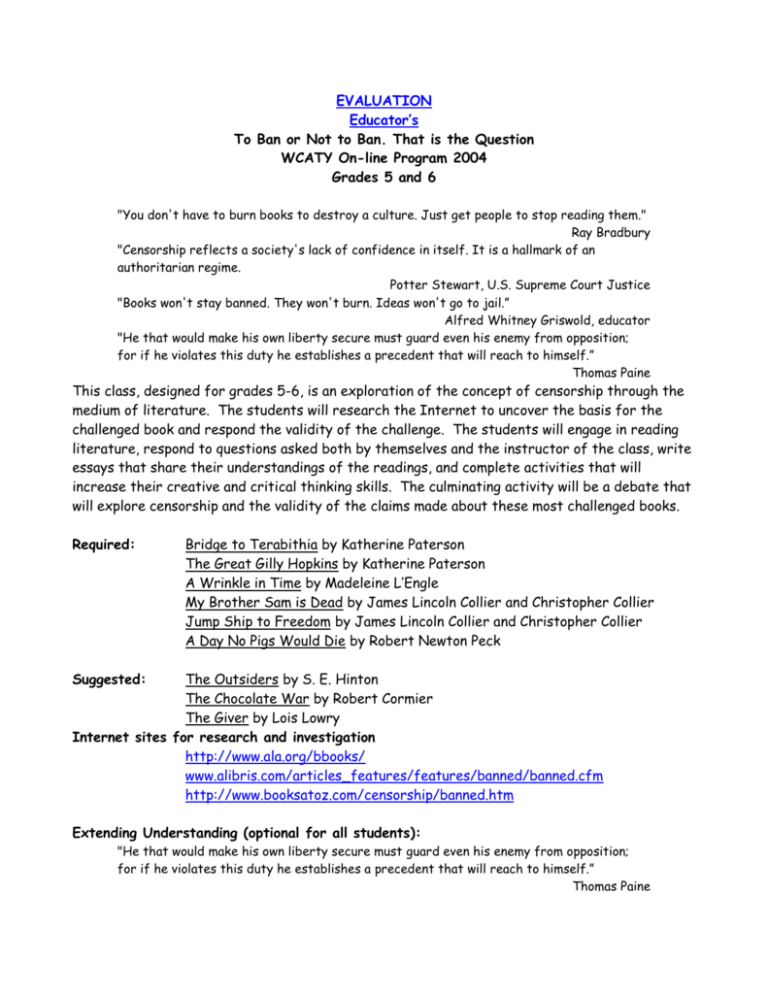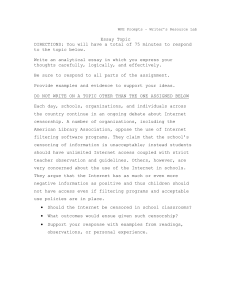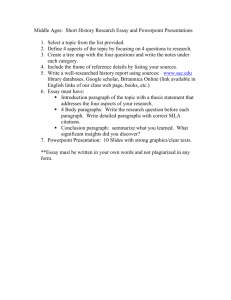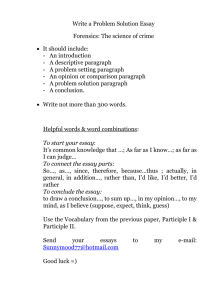
EVALUATION
Educator’s
To Ban or Not to Ban. That is the Question
WCATY On-line Program 2004
Grades 5 and 6
"You don't have to burn books to destroy a culture. Just get people to stop reading them."
Ray Bradbury
"Censorship reflects a society's lack of confidence in itself. It is a hallmark of an
authoritarian regime.
Potter Stewart, U.S. Supreme Court Justice
"Books won't stay banned. They won't burn. Ideas won't go to jail.”
Alfred Whitney Griswold, educator
"He that would make his own liberty secure must guard even his enemy from opposition;
for if he violates this duty he establishes a precedent that will reach to himself.”
Thomas Paine
This class, designed for grades 5-6, is an exploration of the concept of censorship through the
medium of literature. The students will research the Internet to uncover the basis for the
challenged book and respond the validity of the challenge. The students will engage in reading
literature, respond to questions asked both by themselves and the instructor of the class, write
essays that share their understandings of the readings, and complete activities that will
increase their creative and critical thinking skills. The culminating activity will be a debate that
will explore censorship and the validity of the claims made about these most challenged books.
Required:
Bridge to Terabithia by Katherine Paterson
The Great Gilly Hopkins by Katherine Paterson
A Wrinkle in Time by Madeleine L’Engle
My Brother Sam is Dead by James Lincoln Collier and Christopher Collier
Jump Ship to Freedom by James Lincoln Collier and Christopher Collier
A Day No Pigs Would Die by Robert Newton Peck
Suggested:
The Outsiders by S. E. Hinton
The Chocolate War by Robert Cormier
The Giver by Lois Lowry
Internet sites for research and investigation
http://www.ala.org/bbooks/
www.alibris.com/articles_features/features/banned/banned.cfm
http://www.booksatoz.com/censorship/banned.htm
Extending Understanding (optional for all students):
"He that would make his own liberty secure must guard even his enemy from opposition;
for if he violates this duty he establishes a precedent that will reach to himself.”
Thomas Paine
Thomas Paine was an essayist in the 18th century. Today people may find his writing hard to understand.
What is he saying in this awkward-sounding statement on censorship?
Pre-session Activities
1.
Fill in the blanks. Answer the following questions with information relevant to you.
a.
b.
(knowledge question) My name is ________________and I live in ______________.
(evaluation question) My favorite activity/interest at school or at home is _________.
c.
d.
(analytical question) A fish that best represents me is a(n) __________ because ___.
(banned question) I think that student who __________ should be banned from school
because ____________.
(forced association) I think that children who read too much should be banned because
they _________________________ to our society.
e.
2.
3.
Vocabulary/Interactive activity. Define censorship as it is found in a dictionary of your
choice. Ask three (3) people what they think censorship is. These people can be a
parent, a teacher, a professional person, a relative, or a student. If they do not know
what censorship means, tell them. Then ask each person to list three thinks that should
be censored.
Pre-session writing assignment. Post on the WCATY “Ban” site by Tuesday, April 6, 2004.
Choose one (1) of the following five (5) topics. Write a short paragraph (about 8 to 10
sentences) outlining your view of the practice of banning or challenging media, books,
television, radio, and live performances.
a.
Many years ago, the Swedish government banned many Mickey Mouse and Roadrunner
cartoons from viewing on television. If you have watched any of these cartoons, write 8 to
10 sentences on why adults in Sweden might ban Mickey Mouse and Roadrunner.
b. The first amendment of the Constitution of the United States preserves the freedom of
speech and expression. The Constitution was written in 1778, over two hundred years ago.
Do you think that the fellows who wrote this document knew what they were talking
about? If they were to return to earth in 2004, do you think they would still want the
United States to preserve this freedom of speech and expression?
c. Jennifer Jackson and Jason Timberlake were presenting the half-time show during the Super
Bowl. They are now being spotlighted in the press for their actions. Should they be
punished for what they did? Or should the television networks be reprimanded for “picking
on them.”
d. At what age should children be allowed to watch television programs that state the “viewer
discretion advised”? Do your parents allow you to watch these programs?? Who should
decide what programs children can watch?
e. Why do children keep others from joining in a game out for recess, or from becoming part of
an already existing group of friends. Are children afraid of something? If so, what?
Posting deadline is Monday, April 12, 2004. This will allow time for students to read and
reflect on other students’ contributions.
Students are asked to respond to at least two other postings with comments to the author.
Face-to-face Meeting
Thursday, April 15, 2004
Sing the Theme song, “Both Sides Now.”
Creative Dramatics: Introductory material has been posted on-line. A three-person skit with
sounds and/or actions by a fish (#3 of Fill in the Blank), and acting out #2 of Fill in the
Blanks.
Listing of interview responses, what things should be banned. Group the final listing into three
categories, with an appropriate title for each category. Discussion of the headings, to
conclude what it is that might prompt censorship.
Questions with Bloom (knowledge) and Guilford (quantity), using the first amendment to the
Constitution of the United States of America.
Questions with Bloom (analysis) and Guilford (forced association), using the opening lines of
Witches by Roal Dahl.
Discussion of on-line activities.
On-line Activities
Students will read the two books by Katherine Paterson OR one book by Katherine
Paterson and one book by L’Engle
Students will answer teacher-generated questions from these texts. Posting should be
within 5 days of the original posting.
Students will be responsible to read at least two other child’s response and write a
reflection or comment to that child.
Students will post at least one question which might “stump” other classmates from one
of the above books. Posting should be within 5 days of the original posting.
Student Investigation. Students will “surf the net” to investigate why people around the nation
think Bridge to Terabithia or The Great Gilly Hopkins should be banned. Each child
should bring in the URLs (Universal Routing Locations) to class. (Sites have been
suggested above. Children will have to investigate bit further to find information about
the particular book read. Accessing the author’s home page might be a start.)
Student Writing. Students will write a five paragraph essay on the books they chose to read.
The essay will address the things books that may be offensive to the general reading
population. Students unable to find evidence on the world-wide-web, should still be able
to write the required essay.
Paragraph #1. Introduction. This should talk about censorship and the
possibilities that things are included in books that some people may not like.
Paragraph #2. Discuss one thing in the book that may be offensive to some
readers. Discuss the actions of the characters and why they may be offensive.
Paragraph #3. Discuss a second thing in the book that may be offensive to some
readers. Discuss the actions of the characters and why they may be offensive.
Paragraph #4 (chose one of three options). 1. Offer suggestions as to how the
author may have rewritten the story to get across the same idea without
offending anybody. 2. If you do not think the author could rewrite the story,
that is to say, the events were vital to the overall story), offer suggestions to
the readers as to how they might accept the section of the book as written.
Try to convince them that these sections should not cause controversy or
prompt a challenge to or banning of the book. 3. Defend the fact the book has
been challenged and defend the fact that it should not only be challenged, but
taken off library shelves immediately.
Paragraph #5. Conclusion. Review the main points of your essay.
This essay needs to be posted on the WCATY web site by Friday, April 30, 2004 to allow time
for students to react to students’ essays.
Students are asked to respond to at least two other postings with comments to the author.
Wednesday, May 5, 2004
Face-to-face meeting
Sing the theme song, “Both Sides Now.”
A brief discussion of the stumper questions.
Each student will write a number of questions using the book each has read.
Students will discuss the characters of each story. What are their personalities? Are they
typical of young people today? How do the characters they meet affect their lives? We
might use a Venn diagram or other visual learning graphic to facilitate the understanding of
character. We will also reorganize/synthesize the stories, by placing each story in a
different context (to be determined).
OR We will use evaluation (Bloom)/viewpoint (Guilford) to discuss thematic material as it relates
to actions? Could the same theme have been presented using different events and actions?
Did the author herself prompt the challenge to her book by the choice of theme and plot
development?
Questions with Bloom (synthesis) and Guilford (reorganization) with the books by Katherine
Paterson. Children will do a quick write (wet ink) for fifteen minutes discussing all the things
that might change in order for the same thematic material to be evident if each main
character with his/her personality were to be in the story line of the other. For example,
how might Gilly have come to grips with her mother’s absence if she lived in rural America
and met Miss Edmunds at school? How might Jesse be able to find his sense of belonging in
urban America, interacting with the blind man and Mrs. Trotter.
On-line Activities
Students will read the two books by the Collier brothers OR one book by the Collier
brothers and one book by L’Engle, Paterson, or Peck.
Students will answer teacher-generated questions from these texts. Posting should be
within 5 days of the original posting.
Students will be responsible to read at least two other child’s response and write a
reflection or comment to that child.
Students will post at least one question which might “stump” other classmates from one
of the above books. Posting should be within 5 days of the original posting.
Student Investigation. Students will “surf the net” to investigate why people around the nation
think Jump Ship to Freedom or My Brother, Sam, is Dead should be banned. Each child
should bring in the URLs (Universal Routing Locations) to class. (Sites have been
suggested above. Children will have to investigate bit further to find information about
the particular book read. Accessing the author’s home page might be a start.)
Student Writing. Students will write a five paragraph essay on the books they chose to read.
The essay will address censorship in other media—art, drama, radio, television, movies,
magazines. Students can chose one of the media listed above. Consider the kinds of
things that are censored that should not be; or consider things that perhaps should be
censored—language (swearing, put-downs, teasing, ridicule), violence (physical, emotional,
psychological), visual images (blood and gore, nudity, death, injection of substances),
subject content (consider the books we have read, this list may be very long), actions
(killing, kissing, dancing, laughing).
Paragraph #1. Introduction. This should introduce the medium the student wishes
to address and the kinds of things (language, violence, visual images, etc.) that
will be discussed.
Paragraph #2 (optional). Discuss the medium and is potential for both the
distribution of good information as well as the possibility for abuse.
Paragraph #3. Discuss the first topic of consideration. Discuss the aspects of
the behavior that may be harmful. Harmful for whom? Harmful in what way?
Should there be age limits imposed? Should those not allowed to
see/hear/experience this behavior be allowed to engage in this medium if
accompanied by another who can view/hear/experience the behavior?
Paragraph #4 Discuss another topic of concern with this medium. See the above
paragraph for possible ideas.
Paragraph #5 (optional). Discuss possible solutions to the issue of censorship in
this medium. How might the industry make it available to the public without
generating outrage and anger.
Paragraph #5. Conclusion. Review the main points of your essay.
This essay needs to be posted on the WCATY web site by Friday, May 21, 2004 to allow time
for students to react to students’ essays.
Students are asked to respond to at least two other postings with comments to the author.
Wednesday, May 26, 2004
Face-to-face meeting
Sing the theme song, “Both Sides Now.”
A brief discussion of the stumper questions.
Collect essays on censorship of other media
Evaluation form for the class.
Students will prepare for a final debate on one of the books we have read. Each paired team
will follow the usual debate procedure:
First Affirmative Speaker—3 minutes
First Negative Speaker—3 minutes
Second Affirmative Speaker—3 minutes
Second Negative Speaker—3 minutes
Take questions for both sides from the audience or from each other—5 minutes
Concluding Negative Speech—3 minutes
Concluding Affirmative Speech—3 minutes
Self-evaluation of debate performance using “Rubric for Creative Project.”
Both Sides Now
(JONI MITCHELL)
Rows and flows of angel hair
And ice cream castles in the air
And feather canyons everywhere
I've looked at clouds that way
But now they only block the sun
They rain and they snow on everyone
So many things I would have done
But clouds got in my way
I've looked at clouds from both sides now
From up and down, and still somehow
It's cloud illusions I recall
I really don't know clouds at all
Moons and Junes and Ferris wheels
The dizzy dancing way that you feel
As every fairy tale comes real
I've looked at love that way
But now it's just another show
And you leave 'em laughing when you go
And if you care, don't let them know
Don't give yourself away
I've looked at love from both sides now
From give and take, and still somehow
It's love's illusions I recall
I really don't know love
Really don't know love at all
Tears and fears and feeling proud
To say "I love you" right out loud
Dreams and schemes and circus crowds
I've looked at life that way
Oh but now old friends they're acting strange
And they shake their heads
And they tell me that I've changed
Well something's lost but something's gained
In living every day
I've looked at life from both sides now
From win and lose and still somehow
It's life's illusions I recall
I really don't know life at all
It's life's illusions I recall
I really don't know life
I really don't know life at all
COPYRIGHT 1967 (RENEWED) CRAZY CROW MUSIC.
ALL RIGHTS ADMINISTERED BY SONY/ATV MUSIC
PUBLISHING
8 MUSIC SQUARE WEST
NASHVILLE, TN 37203.
ALL RIGHTS RESERVED. USED BY PERMISSION









